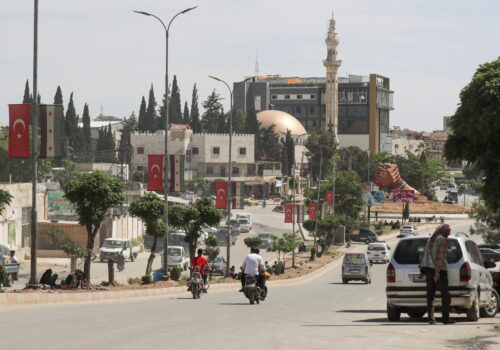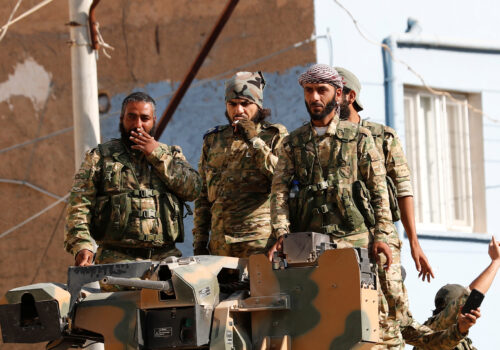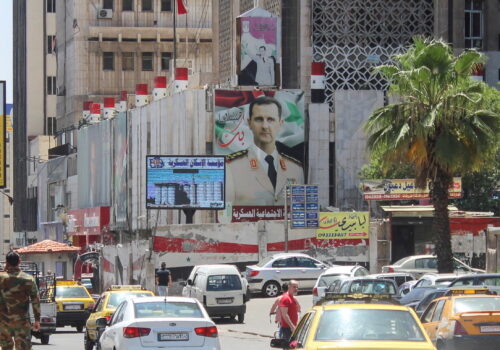
Syria’s inflated electorate is caused by phantom voters

President Bashar al-Assad set July 15 as election day for the 250 seats of the Syrian People’s Assembly held in the areas controlled by his government. As the electoral process unfolds, a series of articles will deconstruct the key elements of Syrian elections and their role in legitimizing Baath Party rule. This series will also conduct a deep dive into the challenges of moving ahead with electoral reform in the United Nations (UN)-facilitated political process. The first article of the series discussed the outline of the election process and its significance, while the second article examined the system of representation, which determines the voting method and how many candidates will be elected from each of the districts.
This article presents the structure of the Syrian electorate: who the voters are, how many voters are there, and why credible projections are so elusive. In theory, the constitution guarantees all Syrian citizens voting rights—with consequential caveats built into the electoral and nationality laws.
Syrian citizens obtain their status through their father, as defined by the Nationality Law of 1969, but cannot obtain it through their mothers. Syrian women also cannot pass citizenship to their husbands. Yet, there are shortcuts to Syrian citizenship—the Syrian interior minister has significant authority to grant citizenship through facilitated or exceptional naturalization processes.
SIGN UP FOR THIS WEEK IN THE MIDEAST NEWSLETTER
The Syrian opposition claims the government is altering demographics and voting preferences by granting citizenship to foreigners fighting in the conflict. There are no reliable reports about the number of foreigners granted citizenship since 2011, but the issue is politically significant and Syrians are keenly aware of the Lebanese case. This matter is especially relevant for ethnic Kurds, who have historically been denied their citizenship rights. On the opposite side, the right to vote in assembly elections has been extended to the military since 2016, but this has only fueled suspicions of vote manipulations.
The laws include a few other categories of potentially problematic restrictions, but it is unclear whether they significantly impact the electorate’s structure. For example, those convicted of a “felony or dishonorable misdemeanor or that which shakes public trust” and those “mentally ill in a manner that affects his eligibility” are excluded from the electorate. However, the Syrian diaspora is the largest group of Syrians excluded from the elections. While the diaspora has the right to vote in the presidential election, that right is not extended to the assembly elections. This is contrary to the provisions of the United Nations Security Council (UNSC) Resolution 2254, which recommends diaspora participation in elections.
If given the right, how many Syrians in the diaspora could vote? For that matter, how many Syrians in total would have the right to vote? Unfortunately, it is impossible to answer that question credibly. The underlying reason for the speculative nature of the electorate’s size is that, despite being legally required to do so, the government does not register voters. Nor does it compile the voter lists. Evidence from previous elections clearly confirms that voter registration is nonexistent. In the 2020 and 2021 elections, there was no voter registration, polling committees did not have a voter list, instead they had blank forms to register voters as they approached the polls. Similarly, there was no evidence of voter-registration activities before this year’s elections.
So, where do the data about voters published by the government come from? According to statements by governmental officials, they come from the civil registry. However, in Syria this cannot be considered an accurate record of citizens. While the Assad regime used the administrative apparatus to control the population, it failed to create an orderly civil registry, even before the conflict. Since the conflict began in 2011, maintenance of the civil registry has been disrupted. Efforts by nongovernmental organizations (NGOs) to preserve records might be crucial for those who will need to prove their civil status in the future, but these records are not reflected in the current version of the civil registry.
Official voter data are extremely scarce. Historically, the Supreme Judicial Election Commission only publishes overall voter numbers. These are virtually impossible to analyze, as no details are provided, and data are not even broken down by governorate. Governors or governorate-level commissions sometimes provide these randomly, but they are often rounded up by commissions without explanation.

*The lower number of registered voters in 2016 may be accounted for by the fact that elections did not take place in Raqqa and Idlib provinces, which were controlled by the Islamic State of Iraq and al-Sham (ISIS) and the al-Qaeda-linked al-Nusra Front.
The significant increase in the number of reported registered voters in 2020 is likely due to the change in how the number is calculated. In the pre-2020 elections, the election committees received a preliminary voters list extracted from the civil registry. They would then audit the list by removing and adding voters. Since the 2020 election, that process has been abandoned, and the number of registered voters simply reflects all the civil registry adult records.
When it comes to diaspora voters, the numbers are difficult to crunch. The Syrian population is estimated to range between 24–27 million, with 16–20 million Syrians in the country and 5–6.7 million outside the country. Turkey, Lebanon, and Jordan alone are hosting more than 5 million Syrian refugees. Using a conservative estimate, the Syrian voting-age population is about 60 percent, which would imply 14–16 million voters in the country and 3–4 million outside the country. That would be within the range of the 18 million voters claimed by the government. However, it is unclear how many live in the government-controlled areas, as the estimate of 9.5 million might not be reliable.
In contrast to the previous election, the government has not issued a single statement about the size of the electorate, no matter how incredible the numbers may be. A comparison of reports from various sources regarding the eight rounds of assembly elections starting in 1990 shows that turnout varies between 50–60 percent. Extrapolating this and applying it to the number of voters who voted in the 2020 elections, in theory, suggests that the total number of voters should not be more than 10 million, which is much smaller than the previously announced 18 million.

Is it possible that, in the pre-2020 elections, almost half of the Syrian electorate was missing from the voter lists? Or are the post-2020 election figures enormously inflated? The confusion over the true size of the electorate will certainly not be resolved in these elections. The Assad government is not investing in even minimal efforts to sort out the voter registry. If there is ever a chance to hold elections according to the standards set by UNSC Resolution 2254, voter-registration reform will be one of the most technically and logistically challenging aspects. Such reform would need to protect the right of Syrians inside and outside the country to vote, while also infusing a basic transparency standard into the electoral process.
Vladimir Pran advises electoral authorities, governments, and political leaders on transitional, electoral, and political processes.
Maroun Sfeir advises international and local civil society organizations, political groups, and electoral authorities on electoral and political processes.
Further reading
Mon, Jun 24, 2024
The Syrian electoral system guarantees inequality
MENASource By Vladimir Pran and Maroun Sfeir
The framework of the block vote is so advantageous to the Baath Party that opposition parties would not stand a chance to win a significant number of seats.
Tue, Jun 18, 2024
From rebel factions to an army: Efforts to tame the Syrian National Army
MENASource By Levent Kemal
The ultimate goal of reforming the SNA is to create space for a self-sufficient political actor that organizes public policies.
Thu, Apr 25, 2024
The Syrian parliamentary elections are coming up. Should anyone care?
MENASource By Vladimir Pran and Maroun Sfeir
The polls will be held again against a backdrop of massive displacement, unresolved conflict, partial occupation, and an intransigent regime.
Image: A man casts his vote inside a polling station during the parliamentary elections in Damascus, Syria July 19, 2020. REUTERS/Omar Sanadiki



